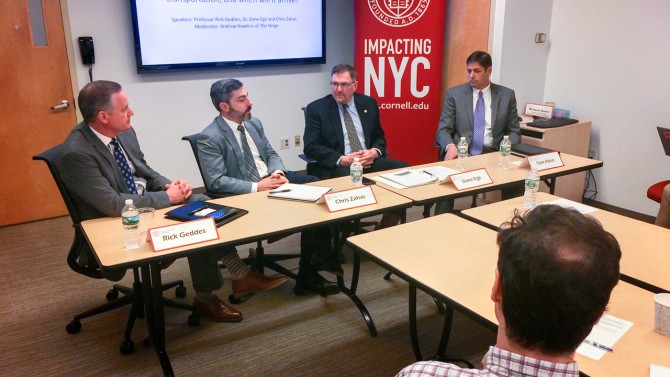The future of high-speed tube travel discussed in NYC
By Jon Craig
Imagine traveling between New York City and Washington, D.C., in 30 minutes instead of five hours. The technology exists to safely transport commuters in high-speed vacuum tubes. Ten companies are actively pursuing the literal pipe dream – but the development cost and need for public-private coordination is extremely high, according to a panel of experts who spoke at Cornell’s ILR Conference Center Dec. 1.
Journalists got a glimpse into the future of high-speed travel during an Inside Cornell talk in Manhattan that previewed an evening reception by members of the Hyperloop Advanced Research Partnership (HARP), founded about a year ago.
R. Richard Geddes, professor in the Department of Policy Analysis and Management at Cornell and director of the Cornell Program in Infrastructure Policy, has a key role promoting and coordinating HARP’s goals. Geddes’ research focuses on funding and financing major infrastructure projects in the transportation and water sectors – including innovative public-private partnerships.
“We are ripe for a new mode of transportation to emerge,” Geddes said.
An increasing number of companies and transit systems are reinventing transportation. Hyperloop is a bold but not new concept that is driving interest – domestically and internationally – in high-speed tube transit. In October, Maryland gave permission to begin a hyperloop project there.
Geddes explained that passenger jets need to climb to 30,000 feet for air resistance to be quite low. “The Hyperloop can achieve that at ground level or below ground level.”
Hyperloop travel does not burn as much energy, is safer and is not affected by weather conditions like traditional modes of travel, Geddes added. “Pods moving through tubes would be completely computer-controlled to avoid accidents,” he said.
HARP President Dane Egli, former White House National Security Council director for counterterrorism, said developing high-speed travel through tunnel vacuums will be costly but is inevitable: “It’s going to bring space travel to Earth.”
Clean, fast and cheaper over the long haul will win out over century-plus-old thinking about how to navigate antiquated, congested roads, runways, rivers and rails, Egli said.
“The technology is there. An element of this is absolutely exciting, like the ‘Jetsons,’” he said, referring to the futuristic 1960s cartoon series.
Egli predicted that so-called Hyperloop systems, already being tested outside Las Vegas and in Colorado, will emerge in key areas of the country in one to three years. “In five to 10 years we will start stringing together a network,” he said.
Given the high density of mass transit users in suburban New York City, Egli said, “Obviously, New York is an ideal location to do it. It begins to close the divides between the haves and have nots.”
Egli and other panelists said with higher-speed transit, the workforce will be able to find more job opportunities longer distances away from their homes and travel to and from work more efficiently. “We are talking about an expensive project,” he said. “We need to find public-private partnerships. In the next three to five years, you’re going to have people looking at this very seriously. All of the experiments have had some level of success.”
Chris Zahas, managing principal of Leland Consulting Group in Portland, Oregon, said there is a lot of secrecy surrounding Hyperloop technology because of competitive trade pressures. “The challenge is which technology wins out,” Zahas said. “The sooner collaboration happens ... the quicker it hits the ground.”
Geddes added, “It’s not really that big a departure from what we have now,” referring to advances in high-speed railroads.
The panelists also hosted an evening event to promote Hyperloop and reach out to new potential partners that attracted top transit visionaries and policy experts who are shaping the future of high-speed tube transportation through public, private and academic partnerships.
Jon Craig '80 is a writer based in New York City.
Media Contact
Get Cornell news delivered right to your inbox.
Subscribe